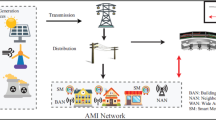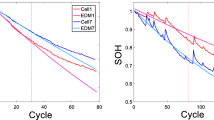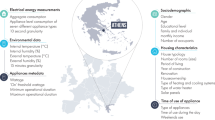Abstract
The prediction of power consumption of smart meters plays a vital role in power distribution and management in the smart grid, which depends on real-time and historical data. However, existing schemes do not meet the standard requirements of the prediction, are difficult to deploy, and do not achieve the desired accuracy. In this paper, an Ensemble learning based power consumption prediction model (EPC-PM) is proposed for the smart meter. Ensemble learning calculates the weights of base predictors and the voting engine selects the suitable predictor that has high accuracy and generates the final predicted output. The performance of base predictors is considered for the next iterations of prediction. Further, the predicted output can be used for power distribution and management by the smart grid. Experimental and statistical analysis shows that EPC-PM is more efficient than existing state-of-the-art works in terms of performance. The proposed EPC-PM improves the root mean square error, normalized root mean square error, and mean absolute error up to 0.2467, 13.45, and 0.1761, respectively, over the UMass Smart* dataset.









Similar content being viewed by others
Data availability
The data is available upon reasonable request to the corresponding authors.
References
Ashutosh Singh, Kumar Kumar, Jatinder A (2022) Privacy-preserving multidimensional data aggregation scheme with secure query processing for smart grid. J Supercomput https://doi.org/10.1007/s11227-022-04794-9
Yem Souhe, Felix Ghislain, Teplaira Boum Alexandre, Pierre Ele, Franklin Mbey Camille, Vinny Junior, Foba Kakeu (2022) A novel smart method for state estimation in a smart grid using smart meter data. Appl Comput Intell Soft Comput 2022:1–14
Boum Alexandre Teplaira, Kakeu Foba, Junior Vinny, Mbey Camille Franklin, Souhe Felix Ghislain Yem (2022) Photovoltaic power generation forecasting using a novel hybrid intelligent model in smart grid. Comput Intell Neurosci https://doi.org/10.1155/2022/7495548
Deng Ruilong, Yang Zaiyue, Chow Mo-Yuen, Chen Jiming (2015) A survey on demand response in smart grids: mathematical models and approaches. IEEE Trans Ind Inf 11(3):570–582
Deepak Kalra, Manas Ranjan Pradhan (2021) Enduring data analytics for reliable data management in handling smart city services. Soft Comput 25(18):12213–12225
Weicong Kong, Zhao Yang Dong, Youwei Jia, Hill David J, Yan Xu, Yuan Zhang (2017) Short-term residential load forecasting based on LSTM recurrent neural network. IEEE Trans Smart Grid 10(1):841–851
Um-E Alvi, Waqas Ahmed, Muhammad Rehan, Shakeel Ahmed, Rizwan Ahmad, Ijaz Ahmed (2022) A novel incremental cost consensus approach for distributed economic dispatch over directed communication topologies in a smart grid. Soft Comput 26(201):1–16
Douglas Andrew P, Breipohl Arthur M, Lee Fred N, Adapa Rambabu (1998) Risk due to load forecast uncertainty in short term power system planning. IEEE Trans Power Syst 13(4):1493–1499
Gajowniczek Krzysztof, Zabkowski Tomasz (2014) Short term electricity forecasting using individual smart meter data. Procedia Comput Sci 35:589–597
Lai Loi Lei, Zhang Hao Tian, Lai Chun Sing, Xu Fang Yuan, Mishra Sukumar (2013) Investigation on july 2012 indian blackout. In: 2013 International Conference on Machine Learning and Cybernetics, vol. 1, pp. 92–97. IEEE
Global energy network institute, China’s power crisis, The straight times interactive, July 26, 2004, http://www.geni.org/globalenergy/library/media_coverage/the-straits-times/chinas-power-crisis/index.shtml
Muir A, Lopatto J (2004) Final report on the August 14, 2003 blackout in the United States and Canada: causes and recommendations
Yem Souhe Felix Ghislain, Teplaira Boum Alexandre, Pierre Ele, Franklin Mbey Camille, Foba Kakeu Vinny Junior (2022) Fault detection, classification and location in power distribution smart grid using smart meters data. J Appl Sci Eng 26(1):23–34
Amasyali Kadir, El-Gohary Nora M (2018) A review of data-driven building energy consumption prediction studies. Renew Sustain Energy Rev 81:1192–1205
Jitendra Kumar, Deepika Saxena, Kumar Singh Ashutosh, Anand Mohan (2020) Biphase adaptive learning-based neural network model for cloud datacenter workload forecasting. Soft Comput 24(19):14593–14610
Fan Guo-Feng, Peng Li-Ling, Hong Wei-Chiang, Sun Fan (2016) Electric load forecasting by the SVR model with differential empirical mode decomposition and auto regression. Neurocomputing 173:958–970
Hong Wei-Chiang, Dong Yucheng, Zhang Wen Yu, Chen Li-Yueh, Panigrahi BK (2013) Cyclic electric load forecasting by seasonal SVR with chaotic genetic algorithm. Int J Electr Power Energy Syst 44(1):604–614
Zhang Zichen, Hong Wei-Chiang (2019) Electric load forecasting by complete ensemble empirical mode decomposition adaptive noise and support vector regression with quantum-based dragonfly algorithm. Nonlinear Dyn 98(2):1107–1136
Zhang Wei, Dong Xiaowei, Li Huaibao, Jin Xu, Wang Dan (2020) Unsupervised detection of abnormal electricity consumption behavior based on feature engineering. IEEE Access 8:55483–55500
Zhang Zichen, Ding Shifei, Sun Yuting (2020) A support vector regression model hybridized with chaotic krill herd algorithm and empirical mode decomposition for regression task. Neurocomputing 410:185–201
Chou Jui-Sheng, Hsu Shu-Chien, Ngo Ngoc-Tri, Lin Chih-Wei, Tsui Chia-Chi (2019) Hybrid machine learning system to forecast electricity consumption of smart grid-based air conditioners. IEEE Syst J 13(3):3120–3128
Nepal Bishnu, Yamaha Motoi, Yokoe Aya, Yamaji Toshiya (2020) Electricity load forecasting using clustering and ARIMA model for energy management in buildings. Jpn Archit Rev 3(1):62–76
Souhe Felix Ghislain Yem, Mbey Camille Franklin, Boum Alexandre Teplaira, Ele Pierre (2022) A hybrid model for forecasting the consumption of electrical energy in a smart grid. J Eng 2022(6):629–643
Sun Gan, Cong Yang, Hou Dongdong, Fan Huijie, Xiaowei Xu, Haibin Yu (2017) Joint household characteristic prediction via smart meter data. IEEE Trans Smart Grid 10(2):1834–1844
Komatsu Hidenori, Kimura Osamu (2020) Peak demand alert system based on electricity demand forecasting for smart meter data. Energy Build 225:110307
Geetha R, Ramyadevi K, Balasubramanian M (2021) Prediction of domestic power peak demand and consumption using supervised machine learning with smart meter dataset. Multimed Tools Appl 80(13):19675–19693
Fatih Ünal, Abdulaziz Almalaq, Sami Ekici (2021) A novel load forecasting approach based on smart meter data using advance preprocessing and hybrid deep learning. Appl Sci 11(6):2742
Souhe FGY (2021) Forecasting of electrical energy consumption of households in a smart grid. Int J Energy Econ Policy. https://doi.org/10.32479/ijeep.11761
Touzani Samir, Granderson Jessica, Fernandes Samuel (2018) Gradient boosting machine for modeling the energy consumption of commercial buildings. Energy Build 158:1533–1543
Yang Yandong, Li Wei, Gulliver T. Aaron, Li Shufang (2019) Bayesian deep learning-based probabilistic load forecasting in smart grids. IEEE Trans Ind Inf 16(7):4703–4713
Zheng Zibin, Yang Yatao, Niu Xiangdong, Dai Hong-Ning, Zhou Yuren (2017) Wide and deep convolutional neural networks for electricity-theft detection to secure smart grids. IEEE Trans Ind Inf 14(4):1606–1615
UMassTraceRepository, UMass Smart* Dataset - 2017 release, Smart* Data Set for Sustainability, http://traces.cs.umass.edu/index.php/Smart/Smart
Acknowledgements
The authors would like to thank the National Institute of Technology, Kurukshetra, India for financially supporting this research work.
Author information
Authors and Affiliations
Contributions
All the authors have discussed and constructed the ideas, designed the Virtual Machine Placement framework, and wrote the paper together.
Corresponding author
Ethics declarations
Conflict of interest
The authors have no conflict of interest regarding the publication.
Ethical approval
This article does not contain any studies with human participants or animals performed by any of the authors.
Informed consent
Informed consent was obtained from all individual participants included in the study.
Additional information
Publisher's Note
Springer Nature remains neutral with regard to jurisdictional claims in published maps and institutional affiliations.
Rights and permissions
Springer Nature or its licensor (e.g. a society or other partner) holds exclusive rights to this article under a publishing agreement with the author(s) or other rightsholder(s); author self-archiving of the accepted manuscript version of this article is solely governed by the terms of such publishing agreement and applicable law.
About this article
Cite this article
Kumar, J., Gupta, R., Saxena, D. et al. Power consumption forecast model using ensemble learning for smart grid. J Supercomput 79, 11007–11028 (2023). https://doi.org/10.1007/s11227-023-05096-4
Accepted:
Published:
Issue Date:
DOI: https://doi.org/10.1007/s11227-023-05096-4




